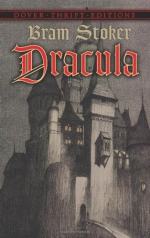touch, the pouf! And there comes a flash of light,
heaven wide, that blind and kill and destroy some.
But that show up all earth below for leagues and
leagues. Is it not so? Well, I shall explain.
To begin, have you ever study the philosophy of crime?
‘Yes’ and ‘No.’ You,
John, yes, for it is a study of insanity. You,
no, Madam Mina, for crime touch you not, not but once.
Still, your mind works true, and argues not a particulari
ad universale. There is this peculiarity in
criminals. It is so constant, in all countries
and at all times, that even police, who know not much
from philosophy, come to know it empirically, that
it is. That is to be empiric. The criminal
always work at one crime, that is the true criminal
who seems predestinate to crime, and who will of none
other. This criminal has not full man brain.
He is clever and cunning and resourceful, but he
be not of man stature as to brain. He be of child
brain in much. Now this criminal of ours is
predestinate to crime also. He, too, have child
brain, and it is of the child to do what he have done.
The little bird, the little fish, the little animal
learn not by principle, but empirically. And
when he learn to do, then there is to him the ground
to start from to do more. ‘Dos pou sto,’
said Archimedes. ‘Give me a fulcrum, and
I shall move the world!’ To do once, is the
fulcrum whereby child brain become man brain.
And until he have the purpose to do more, he continue
to do the same again every time, just as he have done
before! Oh, my dear, I see that your eyes are
opened, and that to you the lightning flash show all
the leagues,” for Mrs. Harker began to clap
her hands and her eyes sparkled.
He went on, “Now you shall speak. Tell
us two dry men of science what you see with those
so bright eyes.” He took her hand and held
it whilst he spoke. His finger and thumb closed
on her pulse, as I thought instinctively and unconsciously,
as she spoke.
“The Count is a criminal and of criminal type.
Nordau and Lombroso would so classify him, and qua
criminal he is of an imperfectly formed mind.
Thus, in a difficulty he has to seek resource in habit.
His past is a clue, and the one page of it that we
know, and that from his own lips, tells that once
before, when in what Mr. Morris would call a ‘tight
place,’ he went back to his own country from
the land he had tried to invade, and thence, without
losing purpose, prepared himself for a new effort.
He came again better equipped for his work, and won.
So he came to London to invade a new land. He
was beaten, and when all hope of success was lost,
and his existence in danger, he fled back over the
sea to his home. Just as formerly he had fled
back over the Danube from Turkey Land.”
“Good, good! Oh, you so clever lady!”
said Van Helsing, enthusiastically, as he stooped
and kissed her hand. A moment later he said
to me, as calmly as though we had been having a sick
room consultation, “Seventy-two only, and in
all this excitement. I have hope.”




